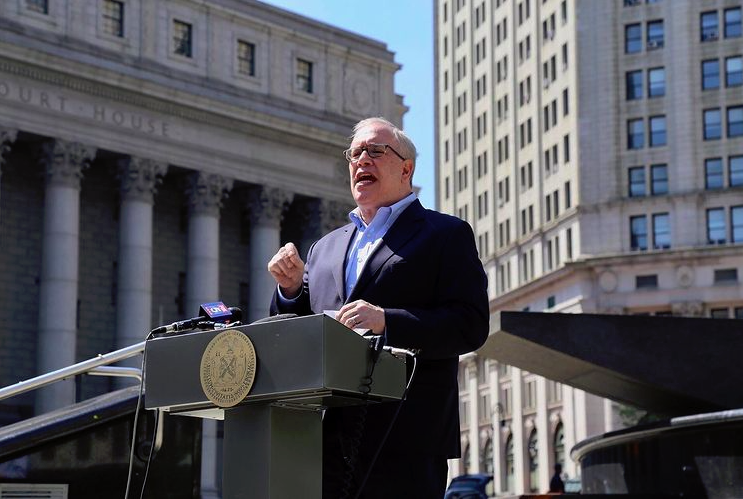The comptroller has issued policy recommendations in dozens of areas of city life, from parks to pregnancy, and veterans to venture capital. How will that translate to a campaign—or a mayoralty?

Office of the Comptroller
When he became comptroller in 2014, Scott Stringer brought a wonk’s appetite for policy to an office with a long-standing and growing policy shop.For many politicians, running for mayor begins with policy boot camp, where candidates decide which issues to feature and what policies to promote, transform long-standing opinions on some issues into wonkish detail and figure out where they stand on other topics.
According to biographer Vincent Cannato, when John Lindsay sought the Liberal Party nomination in 1965 his policy platform was so embryonic that his campaign manager had to obtain not only the questions that Lindsay would be asked at the endorsement meeting, but the preferred answers as well.
Rudy Giuliani sought the wisdom of the conservative Manhattan Institute to sharpen his handling of issues after his 1989 loss. Mike Bloomberg’s top advisers “invited a range of academics and policy experts to school Bloomberg in the ways of city government,” according to Chris McNickle, author of a masterful 2017 biographer of the billionaire mayor. After a decade in elected office, Congressman Ed Koch was still searching for signature issues early in the 1977 race for mayor. Then he started telling people how fervently he supported the death penalty, and saw how much they liked hearing that he did. It became a signature issue, even though the mayor has nothing to do with dispensing capital punishment.
City Comptroller Scott Stringer will not have this problem in 2021.
Over his seven years as the city’s number three official, Stringer has issued dozens of meaty policy reports on everything from healthcare to schools, the arts sector to veterans, venture capital to public restrooms.
Within a three week period in 2019, his office issued a new model for developing city playgrounds, a vision for achieving greater climate resiliency in New York and a plan for affordable child-care for kids three and under. He proposed his own affordable housing plan nearly two years before declaring his candidacy for mayor.
Like any politician’s record, Stringer’s huge library of policy ideas offers fodder for friends, foes and reporters.
Any policy pronouncements he makes during the campaign will be checked against earlier proposals for consistency. At the same time, if Stringer the candidate airs ideas that were first promoted by Stringer the comptroller, they could be dismissed as old news—especially in a race featuring outsider candidates and occurring against the backdrop of a world-altering pandemic.
Overall, however, the plethora of proposals seems an asset to Stringer, who can summon forth well-researched proposals prepared at taxpayer expense to address a panoply of issues that might come up on the campaign trail. They also constitute proof of one of Stringer’s credentials for the city’s top job: that he is a veteran student of government, with the know-how to implement solutions grounded in fact.
The policy shop
Wonkiness has long been Stringer’s brand. As Manhattan borough president from 2006 through 2013, Stringer proposed a new family leave policy, called for changes to nutrition programs and delivered an 86-page wishlist of policy tweaks to the 2010 charter revision commission.
On becoming comptroller in 2014, Stringer took on a set of charter-mandated duties: auditing agencies, registering contracts, monitoring the budget, settling claims and overseeing the pension funds. The office also had developed an unofficial policy function, owing to its bully pulpit power as one of three citywide posts.
In some ways, proposing policy is a natural outgrowth of the comptroller’s auditing function: Each comptroller audit includes recommendations for how an agency or program might perform better. The policy proposals by Stringer and his predecessors usually go further, proposing wholesale changes to what the city is doing, and even the creation of brand-new programs.
Observers trace the comptroller’s policy function back at least to Elizabeth Holtzman, who served as comptroller from 1990 through 1993 and issued policy proposals on schools and waste incineration, a former aide recalled.
“I think the comptroller’s office has always been activist and policy-seeking if not policy-making and that’s by the simple virtue that it’s an elected office and that pretty much every comptroller runs for mayor,” says State Sen. John Liu, who served as comptroller from 2010 through 2013. “It’s not in the written job description but it’s generally understood and has been the case for every comptroller in memory apart from Liz Holtzman, who ran for U.S. Senate.”
Holtzman was succeeded by Alan Hevesi, comptroller from 1994 through 2001. “My recollection is that [Hevesi] undertook a lot of policy also, policies that ran counter to Giuliani,” Liu says. “He put out a number of policy initiatives.” Hevesi also engaged in fights with Giuliani over school funding, foster-care, welfare-to-work contracts and the water system, but those grew out of audits and contract oversight rather than novel policy ideas.
The comptroller’s voice on policy seemed to grow under Hevesi’s successor, William Thompson, who was comptroller from 2002 through 2009 and issued at least a dozen policy proposals on topics like school overcrowding, workforce development and hospital quality. It continued to grow during Liu’s single term: He proposed a higher minimum wage, a stronger system of high-school guidance and an early-childhood education initiative, among others.
Thompson recalls that, upon taking office, “One of the things I realized was we had all these smart people and good people in all kinds of subject areas. So we really created a policy shop at that point,” Thompson says. “It was one of the things that I wanted to do. I think it added to the view of the office. It added depth to the office of comptroller. It made it clear you were not just looking at numbers—you were looking at ideas.”
Impact?
Whether those ideas go anywhere is another story. While comptrollers have significant authority to check mayoral power, they cannot actually seize it and direct agencies to implement their ideas. And mayors are unlikely to leap at the chance to adopt policies proposed by a rival.
“By design mayors and comptrollers are not the closest of friends and sometimes more adversarial than other times but generally the comptroller’s role is to say ‘no’ to the mayor and I think it’s safe to say every mayor in history would have preferred that the comptroller did not exist,” says Liu.
This relationship varies depending on the political moment and the personalities involved. Thompson criticized Bloomberg but was not confrontational, especially in the early years when the city was trying to recover from the September 11 terrorist attacks. Liu, on the other hand, struck a more adversarial tone when he refused Bloomberg’s offer to have lunch shortly after his election. That said, Liu says he and Bloomberg did collaborate on some things, like accelerating the city’s capital plan to take advantage of low interest rates and moving to streamline the city’s pension investments.
The fact that most comptrollers run for mayor could enhance or undermine the power of her or his policy proposals: On one hand, the fact that a potential future mayor is proposing them adds to their cachet. On the other, the proposals can be dismissed as mere political positioning for future races (though Thompson says the likelihood of a mayoral run only becomes a factor late in a comptroller’s term: “Particularly in your first term nobody is looking at you as a potential candidate for mayor. Maybe it would happen in your last two years, but in your first four to six years, no.”)
Stringer briefly ran for mayor against Bill de Blasio and the rest of the Democratic field in 2013 before shifting to the comptroller’s race. He also mulled a challenge to de Blasio in 2017, before opting to seek reelection instead. His 2021 candidacy has been a foregone conclusion for at least four years, if not longer.
Still, Stringer has had occasion to claim credit for policy moves that de Blasio made that were in line with his own recommendations. Back in June, for example, he hailed de Blasio’s announcement that he supported creation of an online database of police disciplinary records—something Stringer had called for. More recently, he noted that de Blasio had agreed to pre-register seniors for COVID-19 shots, something Stringer had suggested in a letter the day before.
Stringer’s office says their policy proposals have also resulted in de Blasio’s creation of a chief diversity officer in each agency to improve MWBE contracting, discounts to alleviate exorbitant in-city MetroNorth fares, pilot projects to allow tenants to use rent payments to boost credit scores, the installation of sunscreen dispensers at some city beaches and pools, getting pregnancy recognized in New York State as a qualifying event under Obamacare, more funding for physical education and art teachers and the provision of free air-conditioners to thousands of senior citizens.
In a statement to City Limits, Stringer said, “From calling for reform in corporate America and opening doors of opportunity to women and people of color, to shining a light on affordability, housing, child care, transportation, and public services, my team and I have shaped this office over the last seven years into a policy think tank for the entire city – generating ideas and tangible solutions to our many challenges.”
Shifting gears
Stringer is certainly not the only mayoral hopeful fluent in policy. Shaun Donovan, the former city housing commissioner and federal HUD secretary, has issued detailed plans on climate, schools and aging. One-time mayoral counsel Maya Wiley put out a plan for using capital spending to create jobs, Eric Adams released a run-down of 100 ideas he’d implement, Kathryn Garcia has put forward a climate plan and Dianne Morales has well-formed ideas on housing, education, policing and jobs.
Stringer just has a deeper well to draw from. Yet so far his campaign seems to have hung back as others offered policy proclamations. The only major policy paper released by Stringer’s campaign so far, on climate change, is very much consistent with what the comptroller proposed in a May 2019 policy paper. There, as in the campaign publication, Stringer calls for a comprehensive resiliency plan, buyouts for property owners in very vulnerable locations and new financing mechanisms for resiliency work. The main difference with the campaign plan is that it’s much broader—it addresses how to reduce carbon emissions as well as how to prepare for climate impacts.
Other comptroller plans that might foreshadow what Stringer is going to pitch on the campaign trail include his NYC For All housing proposal, his prescriptions for the bus system and his outer-borough jobs plan.
Of course, as Stringer looks to move his desk from the Municipal Building to City Hall, a race is on to replace him as comptroller. As de Blasio had Stringer peering over his shoulder and offering unsolicited suggestions, so too will Stringer have to contend with a comptroller who, following the trend Stringer amplified, seeks to be a significant voice in the city’s policy discussion. Will that be as a partner or a rival of the mayor?
“It has to be both,” Brooklyn Councilmember Brad Lander, who is running in the Democratic primary along with State Sens. Brian Benjamin and Kevin Parker and Assemblyman David Weprin, told the WBAI Max & Murphy Show this week. “New Yorkers need to be able to count on the comptroller to be independent of the mayor—yes, to try to work together so we can move the city forward, but also to have that honest, independent voice who’s going to insist on making government work, who’s going to really tell the truth.”










One thought on “Give Scott Stringer This: He Has Proposed a Hell of a Lot of Policies”
Intelligent guy, but still not addressing the concerns of NYC’s middle-class. But then again so far neither have any of the other candidates.